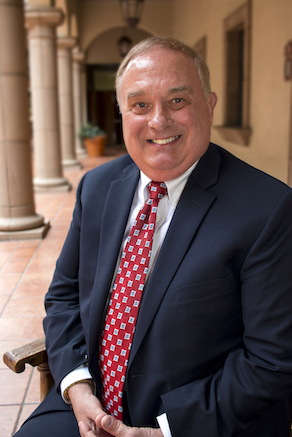Daily Business Report-Feb. 20,2019
Centrum, a Class A office project by Sunroad Enterprises.
In Kearny Mesa, Sunroad Enterprises
introduces Class A office project and
new housing next door for office tenants
Sunroad Enterprises introduces Centrum, an 11-story, Class A office project totaling 279,800 square feet in Kearny Mesa with proximity to an abundance of multi-family options for their employees.
Sunroad also announced the groundbreaking of the final phase of the master planned commercial area in Kearny Mesa commonly referred to as the Spectrum. The centerpiece of the final phase is Vive Lux, a new 442-unit luxury apartment rental community located along Spectrum Center Boulevard next to Centrum. Vive Lux is scheduled to commence construction in the first quarter of 2019 with completion set for mid-2021. Rendering of Vive Lux luxury apartment rental project.

Vive Lux will include a 2,500-square-foot gym, open-air lounge on the fifth floor, wine tasting room, cabanas, pool and pool room, hot tub, game room, activity center, concierge services, dog spa, bike storage, work center, private work room, and conference center. The leasing center will also be on site.
“The opportunity to develop a 442-unit, luxury apartment complex alongside central San Diego’s premier Class A office project is a very rare opportunity and will cater to the demand for a live-work environment,” said Dan Feldman, president of Sunroad Asset Management. “By providing a true mixed-use experience we are able to offer our office tenants housing options next door to their place of work in addition to amenities typically reserved for the apartment residents.”
Located at 8620 Spectrum Center Blvd., the 11-story office tower also resides within the master-planned Spectrum community featuring over 2,500 residential units, a two-acre park and an abundance of surrounding retail, restaurant and fitness services.
Cushman & Wakefield’s Derek Hulse and Brett Ward have been hired to lead the leasing efforts for the Class A office tower, which is now pre-leasing.
__________________

Voice of San Diego sues SDSU for records
to shed light on Mission Valley Plans
Voice of San Diego is suing San Diego State University for withholding public records that may show how the university plans to expand its campus into Mission Valley, build a river park and a new stadium – all without raising student tuition and fees.
Last fall, voters handed SDSU the keys to the old Qualcomm Stadium site by approving a measure that essentially forces the city to sell land to the university. The campus expansion may cost the university hundreds of millions of dollars to build a new stadium and begin preparing the land.
Before the election, SDSU officials and allies promised that the university would not have to raise student tuition or fees to pay for the development. They would get money from private partners, donors or the largesse of the California State University system, of which SDSU is a part.
During the weeks leading up to the November election and in the months since, the university declined to provide details showing how it can be so sure it will protect students from any price hikes.
__________________

Bee die-offs becoming
an urgent agricultural issue
By Dan Morain | CALmatters
Bee die-offs have become an urgent agricultural issue, one that is getting increasing attention from researchers nationwide.
Millions of bees are deployed each year at this time across the Central Valley to pollinate almonds, California’s third most valuable agricultural commodity, and one that cannot exist without pollinators. Almonds were a $5.6 billion crop in 2017.
Those stakes have ramped up research: A study by Ohio State University researcher Reed Johnson in the journal Insects, for instance, finds that combinations of insecticides and fungicides deemed individually “safe” for honeybees turn into lethal cocktails when mixed, and may be the culprit in mass bee deaths. The study, supported by the Almond Board of California, has implications for growers.
Johnson: “It just doesn’t make any sense to use an insecticide when you have 80 percent of the nation’s honeybees sitting there exposed to it.”
In another study, of all bee-related laws passed by states between 2000 and 2017, Dr. Damon Hall of the University of Missouri concludes that Minnesota has the most far-reaching vision for bee health.
Minnesota encourages the use of alternative, non-harmful pesticides and has adopted stricter pesticide labeling practices for retail garden plants.
Not that California is a laggard: This was the first state to pass an apiary health law, back in 1883 when bees were used primarily for wax and honey.
No state has gone as far as France, which last year banned five pesticides thought to be implicated in pollinator die-off.
__________________
Putting the brakes on aging:
New therapy can suppress aging
Aging is a leading risk factor for a number of debilitating conditions, including heart disease, cancer and Alzheimer’s disease, to name a few. This makes the need for anti-aging therapies all the more urgent. Now, Salk Institute researchers have developed a new gene therapy to help decelerate the aging process.
The findings, published on Feb. 18, 2018 in the journal Nature Medicine, highlight a novel CRISPR/Cas9 genome-editing therapy that can suppress the accelerated aging observed in mice with Hutchinson-Gilford progeria syndrome, a rare genetic disorder that also afflicts humans. This treatment provides important insight into the molecular pathways involved in accelerated aging, as well as how to reduce toxic proteins via gene therapy.
__________________
Scripps Mercy Hospital receives
$260,000 for opioid treatment
Scripps Mercy Hospital San Diego has received a $260,000 grant as part of a statewide training program that aims to help hospitals and health centers expand patient access to treatment for opioid use disorder, including on-the-spot medical treatment and coordinated outpatient care.
Scripps Mercy is one of 31 health facilities in the state to receive grant funding for the California Bridge Program, which is managed by the Oakland-based Public Health Institute. The program is funded through the California Department of Health Care Services and Substance Abuse and Mental Health Services Administration.
“The goals of the California Bridge Program align very nicely with our commitment at Scripps to help reduce opioid overuse and dependence,” said Valerie Norton, M.D., emergency medicine physician and physician operations executive at Scripps Mercy San Diego. “This program will treat a hospital visit as a critical window for starting opioid addiction treatment.”
__________________
State Senate bill aims to close curtain on circus cruelty
A new bill introduced Tuesday in the California State Senate would make it illegal to use or allow the use of wild and exotic animals in traveling acts. The Circus Cruelty Prevention Act (Senate Bill No. 313), authored by state Sen. Ben Hueso (D-San Diego), and cosponsored by Social Compassion in Legislation and PETA, recognizes both the animal welfare concerns, and public safety concerns of circuses and other traveling shows that force wild or exotic animals to perform.
“Wild animals used in circuses endure cruel training, near-constant confinement, and are deprived of their natural habitat,” said Sen. Hueso. “We cannot allow this type of abuse to occur in California. This bill will ensure that these beautiful creatures are not exploited or cruelly treated within our state.”
__________________
SDSU receives $100,000 to support
Adapted Athletics program
Hollister Incorporated, an independent, employee-owned company that develops, manufactures, and markets health care products worldwide, announced a $100,000 commitment over the next five-years to support the San Diego State University Adapted Athletics program. A minimum of two current or prospective students will receive scholarships to help pursue their academic and athletic goals.
Only a dozen adapted sports programs exist in the U.S. today, and thanks to the Seeds of Hope program, this is changing. The Seeds of Hope Initiative seeks to increase the number of competitive, collegiate adapted athletics programs in the United States. In 2016 at San Diego State University, “Seeds of Hope” were planted in cooperation with the student organization, Aztec Adaptive Sports, and the first competitive, collegiate adapted athletics program in California was launched. Today, the organization has grown from a student organization to a sanctioned part of the College of Health and Human Services.
__________________
Officials look at purchasing
disaster insurance for California
Hoping to save California taxpayers some money after spending nearly $1 billion to fight wildfires last year, three officials say it’s time to look at purchasing disaster insurance for the state.
Napa Democratic Sen. Bill Dodd, Insurance Commissioner Ricardo Lara and Treasurer Fiona Ma announced Senate Bill 290, which would authorize the state to explore purchasing a policy to cover wildfires, earthquakes, floods and other disasters.
“It works just like your home insurance but for our state,” Lara said at a Capitol press conference Thursday. “You pay a premium each year and we are protected. If a disaster strikes, once you cover the deductible, the plan pays you back for your losses.”
__________________
Author Monique Morris to share
stories from her book ‘Pushout…’
In honor of Black History Month, the San Diego Public Library and the University of San Diego are co-hosting an award-winning author and social justice scholar, Monique W. Morris, Ph.D., for two speaking engagements: Saturday, Feb. 23, at the San Diego Central Library, 1 – 3 p.m., and Monday, Feb. 25, 7 – 9 p.m., at the University of San Diego, Copley Library, Mother Hill Reading Room.
With more than three decades of experience in civil rights, education, juvenile and social justice, Morris’ extensive research concludes that Black girls are the most disproportionately represented group of girls in the criminal justice system. In her book, “Pushout: The Criminalization of Black Girls in Schools,” she writes about the importance of culturally competent and gender responsive support for Black girls. “Instead of driving Black girls away from school through exclusionary discipline,” states Morris, “schools should receive black girls as sacred and loved. We should construct schools that are locations of healing and not locations for punishment and harm.”
Both events are free and open to the public, but seating is limited.
For more info, click here
__________________
A different way of thinking for nonprofits’
success — a charity that gives back to other charities

Can business tactics work in a non-profit world? Not only does Gary Rectenwald, executive director of the Catholic Community Foundation of San Diego, say yes, but he has and continues to prove it with his foundation. Rectenwald raised more than $50 million for his new charity in the first two years under his leadership in 2016 and 2017.
The Catholic Community Foundation of San Diego is a charity that gives back to other charities and not necessarily faith-based ones. Currently it supports over 150 charities, both local and national, with 99 percent of the funds going directly to the charities as long as they support the same values.
Rectenwald runs things so successfully by bringing his skills as a business executive to fundraising. After a 30-year career as an information technology executive with IBM, AT&T, and Computerland he decided to make a change and brought his knowledge and expertise to giving back to his community.
Rechtenwald has turned the basic tried-and-true fundraising tactics around that most nonprofits use and looked at things differently. He and his organization focus on the needs of the donor rather than the recipient, in the same way a for-profit business targets its customers by meeting their needs.
“As a Foundation, we wanted to focus on not just what we are doing now but looking to the future,” says Rechtenwald. “We realized that people are thinking differently these days and that is the reason we focus on the need to give, rather than giving to a need. People want to get behind something bigger then themselves to make a difference. We aren’t just an organization behind a computer. We go out into the community encouraging people to support a cause meaningful to them. If they don’t have one, we can help identify one and make a connection for them so their efforts become personal.”
That community networking is one of the most successful tools of the foundation as it allows them to interactive with different sectors (business, education, neighborhood groups and even other nonprofits) so they can learn about the needs and resources to figure out the most efficient and effective partnership.
To donate or learn more about the Catholic Communities Foundation of San Diego, visit https://ccfsd.org/ or call 858-490-8365.




